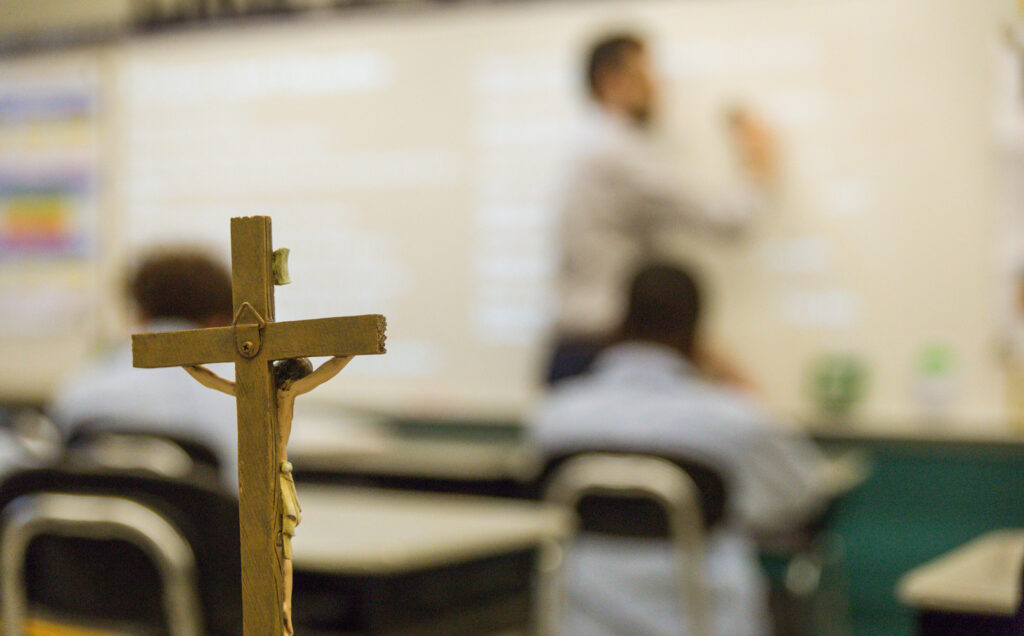‘Choice lifted all boats’: Catholic school enrollment rockets in Florida on parental choice
While traditional public school enrollment declines nationwide, Florida’s expanding school choice options have Catholic enrollment zooming in the Sunshine State.
That’s according to experts…

While traditional public school enrollment declines nationwide, Florida’s expanding school choice options have Catholic enrollment zooming in the Sunshine State.
That’s according to experts at one Florida scholarship program, Step Up for Students.
The trend in Florida could be instructive nationally in helping get kids back to academically thriving classrooms after the performance plunge during and after the pandemic.
“Over and over again, you hear parents say they want safe schools; they want schools that have better academics; and they want schools that also have a component that teaches character education,” Ron Matus, director of policy and public affairs at Step Up For Students, told The Lion.
Catholic schools have been doing just that “at a high level and at a fairly low cost, forever,” he added.
Thanks to Florida leading the nation in a whole range of parental choice options, Catholic enrollment is up 9% in the state over the last ten years, even as states such as Pennsylvania, Illinois, New York and New Jersey have seen Catholic enrollment declining, according to Matus and his colleague Lauren May.
The rising Sunshine State Catholic enrollment numbers are especially impressive because Florida provides a “pretty big mosaic of choice options,” creating a very competitive environment for a whole array of schools that want to attract new enrollment, besides just parochial schools, said Matus.
“Nearly half the students in Florida now attend something other than their zoned neighborhood schools,” found a white paper by Step Up For Students looking at how parental choice has affected enrollment in Catholic schools.
And while declining enrollment in public schools nationwide often has been attributed to demographics, a report from The Hamilton Project and The Brookings Institution in October 2023 found that while COVID-19 aggravated the demographic problem, there are substantial numbers of students who are simply “missing from the public school system.”
That’s why the results in Florida could be especially instructive.
The percentage of non-Catholics, special needs students and students of color who now attend Catholic schools in the state is rising along with general student enrollment, Matus told The Lion.
“With students of color as a whole, Florida Catholic schools are now as diverse as Florida’s public schools. The number of students using special needs scholarships rose by 37% this past year alone (to 8,296 total). And over the last decade, the percentage of non-Catholic students climbed from 13% to 19%. The numbers suggest a wide array of families want what Catholic schools offer — and Florida’s Catholic schools are embracing them,” wrote Matus and May in The Hill.
The results show that more and better options nationally can help lure students back to school.
The implications for Florida’s broad array of parental choice options go far beyond just enrollment numbers in Catholic schools, said Matus.
Parental choice hasn’t caused the widely-predicted “Apocalypse” for public schools in Florida, he said. The education environment across all school types, in fact, has gotten better.
Matus told The Lion that prior to implementing school choice in Florida 25 years ago, the state was the “worst-of-the-worst” in the nation when it came to education performance.
“Everybody upped their game. And now our public schools are amongst the best in the country,” he said. “The truth is, choice lifted all boats.”
Matus said if you look at basic education data in Florida since the late 1990s until now, by virtually every indicator (e.g., NAEP, SAT), Florida is producing better students than it used to.
“Those trend lines have gone up. At the same time, the trend lines for choice have gone up. And it’s not a coincidence,” he concluded.



